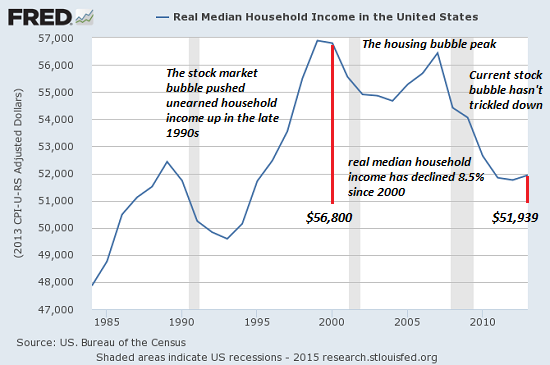Welcome to the Future: Downward Mobility and Social Depression
October 5, 2015
If you don't think these definitions apply, please check back in a year.
The mainstream is finally waking up to the future of the American Dream: downward mobility for all but the top 10% of households. A recent Atlantic article fleshed out the zeitgeist with survey data that suggests the Great Middle Class/Nouveau Proletariat is also waking up to a future of downward mobility: The Downsizing of the American Dream: People used to believe they would someday move on up in the world. Now they’re more concerned with just holding on to what they have.
I dug into the financial and social realities of what it takes to be middle class in today's economy: Are You Really Middle Class?
The reality is that the middle class has been reduced to the sliver just below the top 5%--if we use the standards of the prosperous 1960s as baseline.
The downward mobility isn't just financial--it's a decline in political power, control of one's work and income-producing assets. This article reminds us of what the middle class once represented: What Middle Class? How bourgeois America is getting recast as a proletariat.
The costs of trying to maintain a toehold in the upper-middle class are illuminated in these recent articles on health and healthcare--both part of the downward mobility:
Health Care Slavery and Overwork
How a toxic workplace could, literally, destroy your health
We're afraid our work is killing us, and we are right
This reappraisal of the American Dream is also triggering a reappraisal of the middle class in the decades of widespread prosperity: The Myth of the Middle Class: Have Most Americans Always Been Poor?
And here's the financial reality for the bottom 90%: declining real income:

Downward mobility excels in creating and distributing what I term social defeat: In my lexicon, social defeat is a spectrum of anxiety, insecurity, chronic stress, powerlessness, and fear of declining social status.
One aspect of social defeat is the emptiness we experience when prosperity does not deliver the promised sense of fulfillment. Here is one example: A recent sociological study compared wealthy Hong Kong residents’ sense of contentment with those of the immigrant maids who serve the moneyed Elites. The study found that the maids were much happier than their wealthy masters, who were not infrequently suicidal and depressed.
The maids, on the other hand, had a trustworthy group – other maids they met with on their one day off – and the coherent purpose provided by their support of their families back home.
Downward mobility and social defeat lead to social depression. Here are the conditions that characterize social depression:
1. High expectations of endless rising prosperity have been instilled in generations of citizens as a birthright.
2. Part-time and unemployed people are marginalized, not just financially but socially.
3. Widening income/wealth disparity as those in the top 10% pull away from the shrinking middle class.
4. A systemic decline in social/economic mobility as it becomes increasingly difficult to move from dependence on the state (welfare) or one's parents to financial independence.
5. A widening disconnect between higher education and employment: a college/university degree no longer guarantees a stable, good-paying job.
6. A failure in the Status Quo institutions and mainstream media to recognize social recession as a reality.
7. A systemic failure of imagination within state and private-sector institutions on how to address social recession issues.
8. The abandonment of middle class aspirations by the generations ensnared by the social recession: young people no longer aspire to (or cannot afford) consumerist status symbols such as luxury autos or homeownership.
9. A generational abandonment of marriage, families and independent households as these are no longer affordable to those with part-time or unstable employment, i.e. what I have termed (following Jeremy Rifkin) the end of work.
10. A loss of hope in the young generations as a result of the above conditions.
If you don't think these apply, please check back in a year. We'll have a firmer grasp of social depression in October 2016.
NOTE: Contributions/subscriptions are acknowledged in the order received. Your name and email remain confidential and will not be given to any other individual, company or agency.
|
Thank you, Ailene T. ($5/month), for your superlatively generous subscription to this site -- I am greatly honored by your support and readership. |
Thank you, Kenneth B. ($10/month), for your outrageously generous subscription to this site -- I am greatly honored by your support and readership. |

Discover why I’m looking to retire in a SE Asia luxury resort for $1,200/month.